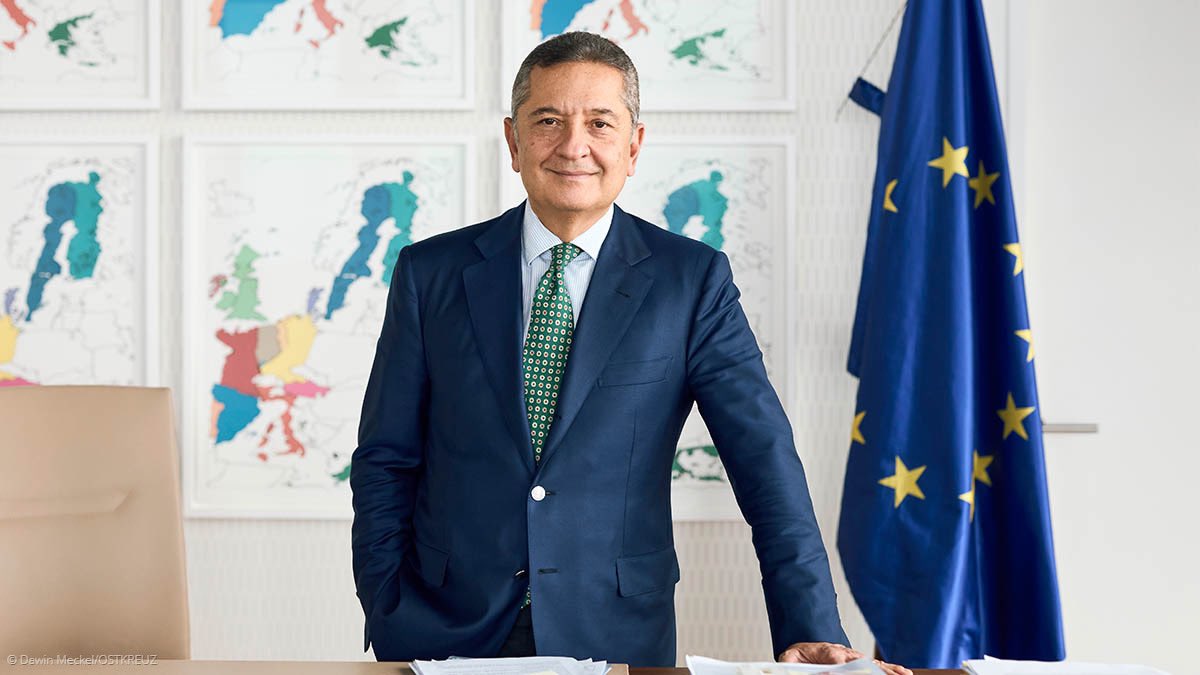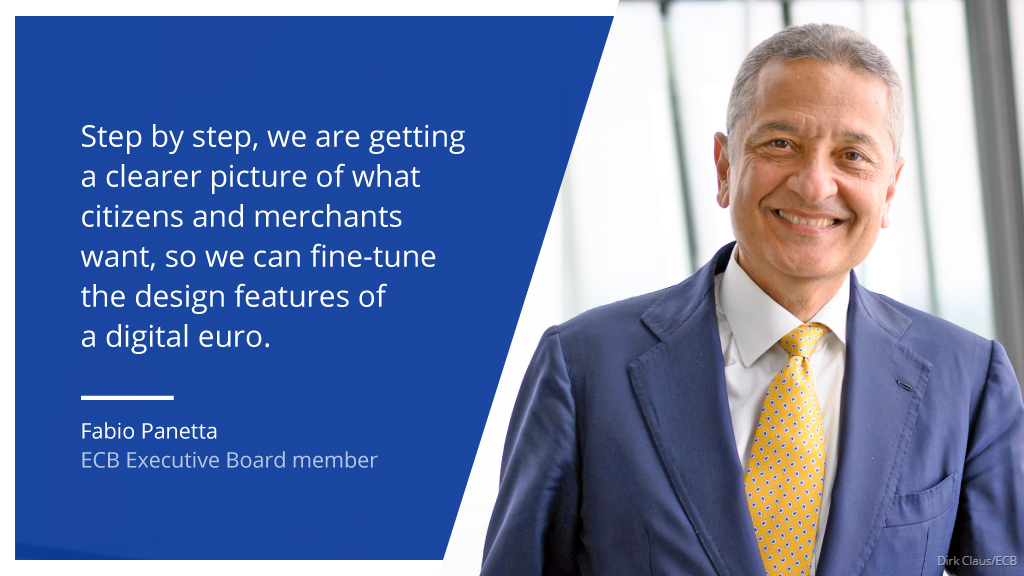
The European Central Bank is the central bank for Europe's single currency, the euro. Its main task is to maintain the euro's purchasing power.
7 subscribers
How to get URL link on X (Twitter) App


 Raising interest rates is our main tool for fighting inflation. But what do higher rates mean for you?
Raising interest rates is our main tool for fighting inflation. But what do higher rates mean for you?
 Panetta: Safeguarding this anchor is what our digital euro project is all about. We want to ensure that central bank money remains available to everyone in the euro area. But we also need to modernise the payment infrastructure underpinning our financial system.
Panetta: Safeguarding this anchor is what our digital euro project is all about. We want to ensure that central bank money remains available to everyone in the euro area. But we also need to modernise the payment infrastructure underpinning our financial system.
 Panetta: With medium-term inflation around 2%, we can gradually reduce stimulus.
Panetta: With medium-term inflation around 2%, we can gradually reduce stimulus.https://twitter.com/ecb/status/1519568358106144768De Guindos: The war in Ukraine is above all a human tragedy causing enormous suffering. But it is also affecting the economy in Europe. Growth will be slower than expected and inflation is likely to remain high in the coming months

 Panetta: Unbacked crypto-assets can’t even fulfil their objective of facilitating payments, since they are too volatile to perform as money. We must decide how to regulate them, seeking a balance between innovation, financial stability and consumer protection
Panetta: Unbacked crypto-assets can’t even fulfil their objective of facilitating payments, since they are too volatile to perform as money. We must decide how to regulate them, seeking a balance between innovation, financial stability and consumer protection
 Exposure to fluctuating energy prices differs across income groups: the less people earn, the bigger the impact of higher prices. Poorer households spend a large percentage of their income on energy, meaning they are particularly affected by rising costs
Exposure to fluctuating energy prices differs across income groups: the less people earn, the bigger the impact of higher prices. Poorer households spend a large percentage of their income on energy, meaning they are particularly affected by rising costs
 Panetta: We want to ensure the digital euro adds value for users and that they have confidence in it. A digital euro could provide a universally accepted and secure solution that facilitates contactless and instant payments
Panetta: We want to ensure the digital euro adds value for users and that they have confidence in it. A digital euro could provide a universally accepted and secure solution that facilitates contactless and instant payments 
 Lane: What we’ve seen in the last number of months is the energy shock, which is by far the dominant factor and which is now further amplified by the war
Lane: What we’ve seen in the last number of months is the energy shock, which is by far the dominant factor and which is now further amplified by the war
 Lagarde: The war will likely lower euro area growth and push up inflation in the short term through:
Lagarde: The war will likely lower euro area growth and push up inflation in the short term through:
 Lane: If disruption in supply is caused by a temporary loss of production capacity, for example a factory shutdown, a recovery in supply capacity will put downward pressure on prices once the shock has reversed
Lane: If disruption in supply is caused by a temporary loss of production capacity, for example a factory shutdown, a recovery in supply capacity will put downward pressure on prices once the shock has reversed
 Half of the banks we assessed expect to be affected by climate-related risks within the next 3-5 years. Notably, none of the banks which judged that they were not exposed had conducted a proper risk assessment 2/4
Half of the banks we assessed expect to be affected by climate-related risks within the next 3-5 years. Notably, none of the banks which judged that they were not exposed had conducted a proper risk assessment 2/4

 Lane: Our analysis shows three temporary factors pushing up inflation now are projected to fade over the next year:
Lane: Our analysis shows three temporary factors pushing up inflation now are projected to fade over the next year: 
 Panetta: People’s confidence in private money depends on its convertibility with central bank money, the safest form of money in the economy. The smooth functioning of payment systems ultimately depends on everyone being able to widely access and use sovereign money.
Panetta: People’s confidence in private money depends on its convertibility with central bank money, the safest form of money in the economy. The smooth functioning of payment systems ultimately depends on everyone being able to widely access and use sovereign money. 
 There were two main reasons for having an inflation buffer in the euro area:
There were two main reasons for having an inflation buffer in the euro area:
 A suite-of-models approach is typically used across the Eurosystem. Although this approach was already in use during our 2003 strategy review, now we use a wider variety of models and existing models have been improved
A suite-of-models approach is typically used across the Eurosystem. Although this approach was already in use during our 2003 strategy review, now we use a wider variety of models and existing models have been improved 
 1⃣Our monetary policy has effectively eased financing conditions since 2014, supported economic growth, employment and brought inflation closer to our target
1⃣Our monetary policy has effectively eased financing conditions since 2014, supported economic growth, employment and brought inflation closer to our target
 Communication helps manage expectations and economic outcomes, so that central banks can deliver on their mandate and keep prices stable.
Communication helps manage expectations and economic outcomes, so that central banks can deliver on their mandate and keep prices stable.
 Lane: Our interest rate policy should not react to inflation shocks expected to fade before the end of our projection horizon. We need to see realised progress in underlying inflation 2/4
Lane: Our interest rate policy should not react to inflation shocks expected to fade before the end of our projection horizon. We need to see realised progress in underlying inflation 2/4

 Panetta: We could see risk-biased technological change, whereby the confluence of big techs’ increasing role in finance and the growth of digital assets such as crypto-assets and stablecoins could bring about sudden and disruptive risks for the global economy 2/4
Panetta: We could see risk-biased technological change, whereby the confluence of big techs’ increasing role in finance and the growth of digital assets such as crypto-assets and stablecoins could bring about sudden and disruptive risks for the global economy 2/4

 Our research suggests longer-term inflation expectations have become less well anchored in the euro area since the global financial and European debt crises, although different metrics point to conflicting signals about the timing and scale of this process
Our research suggests longer-term inflation expectations have become less well anchored in the euro area since the global financial and European debt crises, although different metrics point to conflicting signals about the timing and scale of this process